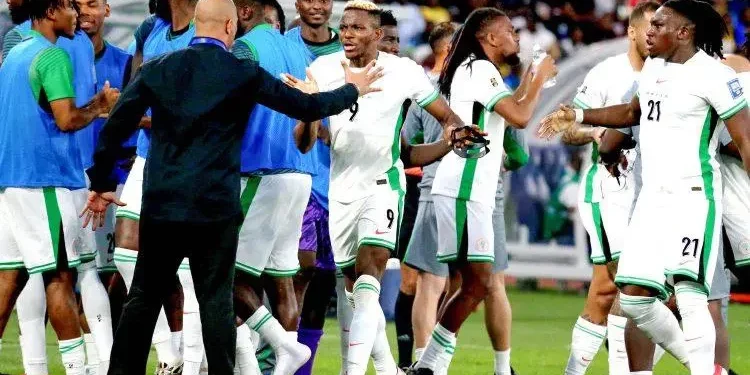The Guild of Sports Editors of Nigeria, representing the nation’s sports media managers, has expressed profound disappointment regarding the Nigeria Football Federation’s (NFF) management of the Super Eagles’ quest to qualify for the 2026 World Cup tournament.
Currently sitting third in Group C of the African qualifying series, Nigeria has amassed 11 points, trailing behind South Africa with 17 points and Benin Republic at 14 points, with only two games remaining. The top team in the group will secure automatic qualification for the World Cup, which will be co-hosted by the United States, Canada, and Mexico, while the second-placed team will have a chance to participate in the playoffs if they rank among the four best runners-up.
As it stands, Nigeria’s chances of even reaching the playoff stage seemed bleak unless both South Africa and Benin Republic falter drastically, coupled with the Super Eagles securing wins in their remaining matches with significant scorelines.
In a statement signed by Guild President, Mr Tony Ubani, and Secretary Dare Esan, the sport editors lamented that the Super Eagles’ poor performance could have been avoided had the team management prepared adequately following the announcement of the qualifying structure in 2023.
“It is unfortunate that those responsible for leading our World Cup campaign delayed taking decisive actions, permitting indiscipline to undermine our bid to participate in the greatest football spectacle,” the statement read.
The Guild noted, “We watched in dismay as the NFF took considerable time to appoint a substantive manager after dismissing Mr. Jose Peseiro, who garnered just two points from two matches. Furthermore, the management of the Finidi George situation revealed a lack of urgency in addressing the rising concern over the team’s qualifying prospects.”
Critically, the NFF’s oversight in allowing content creators access to the Super Eagles’ camp stands in stark contrast to practices observed by other nations, which prohibit such distractions, including mobile phones and gadgets.
The editors highlighted the NFF’s misjudgement in remaining silent while Zimbabwe and Lesotho opted to host matches in South Africa, providing the latter a significant advantage in the qualifying race. “This arrangement allowed South Africa to play six of their nine games at home, and yet the NFF failed to recognise the implications,” they stated. They also pointed out that players were permitted to arrive at camp at their leisure without facing repercussions for tardiness.
Regarding preparations for the crucial match against Rwanda, they noted, “Prior to Nigeria’s last home fixture, the Super Eagles did not commence full training until the Wednesday before the Saturday match, as Coach Eric Chelle only had access to his complete squad that day. This reflects a lack of lessons learned from our failure to qualify for the last World Cup in Qatar.”
The editors called om the Federal Government to invest in the rehabilitation of national stadia in Abuja and Lagos, along with facilities in Kaduna and Enugu, suggesting that improved infrastructure would have bolstered the Super Eagles’ campaign, saying providing alternatives for the team would have helped rejuvenate their campaign when winning games in Uyo became difficult
“We lost our World Cup ticket due to home draws against South Africa, Zimbabwe, and Lesotho, jeopardising the entire campaign. This is truly unfortunate.”
To remedy the situation, the Guild urged the Federal Government to assist the NFF in ensuring the Super Eagles emerge victorious in their final two matches, which could potentially position the country to qualify for the African playoffs as one of the best four second-placed teams. “The Super Eagles cannot afford to miss another World Cup,” they concluded.



